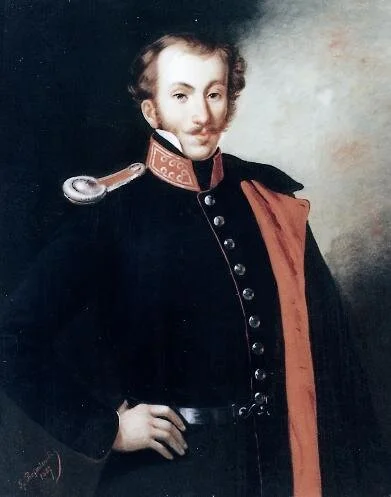Prince, Hero of the Greek War of Independence (1793 – 1832)
Demetrios Hypsilantis, brother of Alexander Hypsilantis descended from a royal Phanariot family that ruled Wallachia during the Ottoman yoke. He served as an officer in the Imperial Russian Army in Moldavia prior to the outbreak of the Greek War of Independence.
Portrait by Spyridon Prosalentis
Demetrios followed his brother in the Greek War of Independence and was initiated in the Society of Friends (Philiki Hetaereia), a secret organization founded by Ioannis Kapodistrias and the Tsakalov brothers in an attempt to liberate Greece from the Turkish yoke. Being in charge of military duties, Demetrios’ first polemic action was the reclaiming of Nafplion along with a small army of French and German Philhellenes led by Valesta, which he himself had organized. Even though it was unsuccessful, Hypsilantis managed to reclaim Argos in 1822.
In 1822, Demetrios Hypsilantis fought alongside Theodoros Kolokotronis, Nikitas Stamatelopoulos, Demetrios Plapoutas, Papaflessas, Panos Kolokotronis and many other worthy fighters against Mahmud Dramali Pasha and his army of 36.000 soldiers in the Battle of Dervenakia. Outnumbered by nearly 28.000 fighters, the Greeks, this time led by Theodoros Kolokotronis fought victoriously against the Ottoman army and liberated an important part of Peloponnesus.
In 1825, when Mahmud Dramali Pasha invaded Peloponnesus once again, Demetrios gathered an army of 350 men from Nafplion and fended off the Ottoman army whilst battling against an exceptionally well organized Egyptian army as well. Following his success, Demetrios was met by Henri de Rigny, commander of the French squadron and Philhellene and this made him rise to fame in the entire Europe among the Philhellenes.
Before the end of the Greek War of Independence he clashed once more with Dramali’s forces. With the coming of Ioannis Kapodistrias in Greece in 1827, Demetrios was appointed Field Marshall of Eastern Greece and with a series of victorious battles he cleared the Greek lands of the Ottoman army, thus liberating important parts of Greece. The Battle of Petra in 1829 was the last battle in the Greek War of Independence. Demetrios Hypsilantis led an army of 3000 brave men against 7000 Ottomans and defeated them, bringing yet another victory to the Greek nation and an end to the Greek War of Independence. He received the highest honours from the Governor of Greece for his services in the war. He died in 1832 in Nafplion.
Bibliography
Barbis, Kostas. Jackals and Hyenas of the Greek Politics. Thessaloniki: Kadmos, 2012. Print.
“Hypsilantis, Demetrius”. Helios New Encyclopaedic Dictionary. Passas, I. Athens. 1946. Print.









